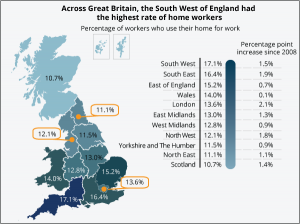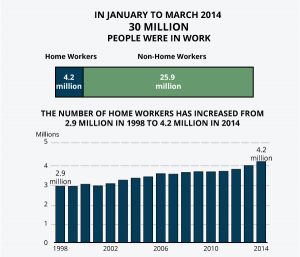This week, two reports have been published which hit hard at the case for HS2. Firstly, the Office for National Statistics has shown that 4.2 million people, or 14% of those in employment now work from home, whilst the Office of Rail Regulation has shown long-distance travel dropping for the second quarter in a row to 4.8 billion passenger kilometres.
 When the ONS first started compiling figures for home working in 2009, there were 2.9 million home workers (11.1%), but since then the growth of the internet has meant those in higher paid occupations and managerial positions now make up account for 73.4% of those working from home.
When the ONS first started compiling figures for home working in 2009, there were 2.9 million home workers (11.1%), but since then the growth of the internet has meant those in higher paid occupations and managerial positions now make up account for 73.4% of those working from home.
Commenting on this report, Frances O’Grady, general secretary of the TUC, said:
 “Improvements in home technology have made home-working an attractive and cheap alternative to costly commutes into the office. But too many bosses still don’t trust staff to work from home and instead force them to trudge into the office so they can keep an eye on them. Employers’ attitudes to new working practices must change to make a much better use of modern technology in all workplaces.”
“Improvements in home technology have made home-working an attractive and cheap alternative to costly commutes into the office. But too many bosses still don’t trust staff to work from home and instead force them to trudge into the office so they can keep an eye on them. Employers’ attitudes to new working practices must change to make a much better use of modern technology in all workplaces.”
HS2 is of course intended to do little in itself to relieve pressure on commuters going in to the office each day, as it delivers capacity where it is least needed, on long-distance rail routes. The fact this is not where capacity is needed has been demonstrated by the latest set of figures from the Office or Rail Regulation, which showed that long-distance passenger kilometres dropped last quarter (2013-14 Q4) from 4.9bn to 4.8bn. In 2013-14 Q2 the figure had been 5bn passenger kilometres. With two consecutive quarters of falling figures, the number of miles travelled by long-distance passengers is in recession for the first time in eleven years.
While the number of fourth quarter long distance passenger journeys has risen slightly from 31.1 (2012-13) to 3.13 (2013-14) million journeys, this number is still below the figure from two years ago (2011-12) of 31.9 million journeys, showing that long-distance passenger numbers have stagnated. In contrast, short distance commuter journeys within London and the South East, which make up over 70% of all rail journeys in the UK, have continued to rise.
Stop HS2 Campaign Manager Joe Rukin said:
“HS2 is all about providing spending billions of pounds to provide long-distance capacity on the rail network, but there are fewer long-distance passengers than two years ago, and the distances being travelled are in recession, so it is going to get harder to justify this white elephant. We have already seen some commentators say that because the ORR figures show overall rail growth, they prove the need for HS2, but that just demonstrates sheer laziness, and a complete ignorance of what these statistics actually mean.”
“With the only real area of rail growth being London and the South East, and it being demonstrated that more people when given the opportunity to work from home will work from home, surely the obvious solution, the cheaper and more sustainable solution, that more people should be encourage to work from home would be evident to anyone with an ounce of common sense.”
“The figures released this week, which show long-distance travel on the decline and home-working on the increase should both set more alarm bells ringing about the supposed the need for HS2, whilst also clearly showing where the priority for infrastructure investment should really lie. HS2 should be cancelled and politicians should start thinking about what the country really needs before more money is wasted on this unnecessary project.”
Stop HS2 Chair Penny Gaines said:
“For a long time, the Department for Transport has been saying HS2 is necessary because of the growth in passenger numbers on the trains. But these latest figures show that HS2 is answering the wrong question. The real rail growth story is in in regional and commuter trains, but HS2 will provide only long distance services. With the increasing numbers of people using the internet to work at home, it’s clear that the Department for Transport has a blinkered view of what’s happening in the real world. They should cancel HS2 immediately, so they can work out the real answers to our communications and transport needs.”

IN VIEW OF THE DISGRACEFUL FIASCO OVER THE TRAM SYSTEM IN SCOTLAND I BELIEVE MORE THAN EVER WE HAVE A RIGHT TO SEE THE ‘HIDDEN’ RED/AMBER REPORT ON HS2 BEFORE OUR IDIOT REPRESENTATIVES WASTE MORE OF OUR MONEY AND RUIN LIVES. WHY SHOULD WE RESPECT THESE PEOPLE WHEN THEY SHOW SUCH CONTEMPT FOR US AND OR LIVES? THEY ARE NO ONES, NO BETTER THAN ANY OF US.THE ELECTION RESULTS I’M SURE WERE NOT JUST ABOUT IMMIGRATION BUT ALSO ABOUT GREENBELT, HS2 ETC.I FEELTHE PARTY WHO OVERSEES THE HS2 NONSENSE IF IT GOES AHEAD WILL NOT BE RE-ELECTED FOR SOME TIME! THE TRAMS FIASCO AND HS2 MAy END UP IN THE NEXT VOLUME OF ‘THE BLUNDERS OF OUR GOVERNMENTS’ BY CREWE/KING. A GOOD READ.
Mark the problem is it is not there own money so easy come easy go and you never know there might be a knighthood or two none of the three party’s seem to care
Westminster and Lay MPs in 2015 is not the way to resolve the issues with the central open county section of Route 3.
If HS2 and its consultants made so many people petition to protect their homes, villages, communities, businesses and farms how can 6 lay MPs provide the solutions to these matters. They cannot and should not. Route 3 central county section is now represented by many people who have like many in the second World War decided to join up and petition. What will be their D-Day action to take on this tyranny of mistaken transport and countryside planning resulting in one of the most restricted railway propositions that must have Brunel and Stevenson turning in their grave with another 35,000 and the Romans in their Burial locations. The Route 3 has been badly planned and the worst impacts are on people the worst impacts are at small villages such as Chetwode, Twyford. Calvert, Quainton and along Aylesbury and Stoke Mandeville.
The UK and British cannot manage renewing technology and rail infrastructure well as was found with MPA IT projects and WCML upgrade. The involvement of politics whether from Labour in the time of Railtrack was as Byers and Hoon/Adonis have shown not suitable for select and sub-committees. Time for the powerful people of the nation to call the political contributions to designing and planning large schemes to and end for civil servant groups and their siamese twinned temorary MPs. If UKIP declare to remove the false belief that politicians without the competencies and experience of running industry should NOT interfere in complex projects it is likely the UK can start moving from dysfunction and bad decisions. D-Day brought out the collective resources to stop tyrany and a the many petitioners and many more people in the UK who find it unbelievable that a few MPs who never designed or planned infrastructure themseleve want to spend over £50B of your taxes and foreign debt on this very poor rail proposal. D is for the disappointment and despair the Cameron, Clegg and Miliband have not the courage or sense to stop this mistaken Route 3 across the counties and sub-urban areas for no benefit to the local people. Expropriating land in the Second world war was accepted for the greater good. This is not the case for the Hybrid Bill. Vote in 2015 to demonstrate your disapproval to this form of governance that has failed on a count of petitioner and the silent but majority bewildered British people generally.